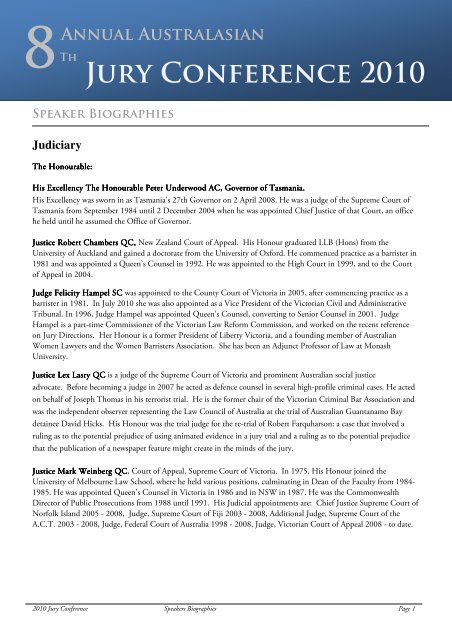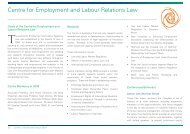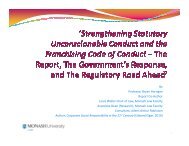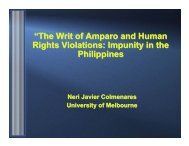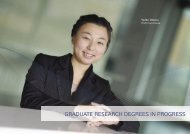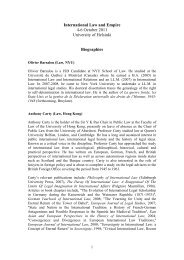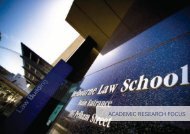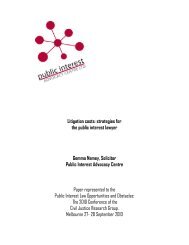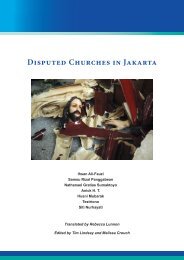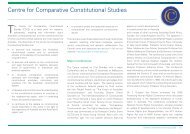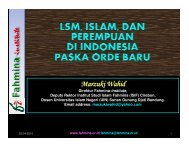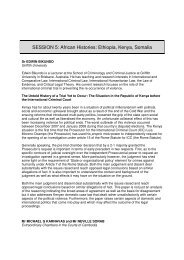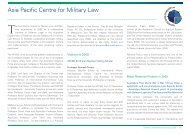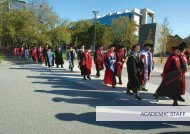Speakers Biographies - University of Melbourne
Speakers Biographies - University of Melbourne
Speakers Biographies - University of Melbourne
Create successful ePaper yourself
Turn your PDF publications into a flip-book with our unique Google optimized e-Paper software.
8<br />
Th<br />
Annual Australasian<br />
Jury Conference 2010<br />
Speaker <strong>Biographies</strong><br />
Judiciary<br />
The Honourable:<br />
His Excellency The<br />
Honourable Peter Underwood AC, Governor <strong>of</strong> Tasmania.<br />
His Excellency was sworn in as Tasmania’s 27th Governor on 2 April 2008. He was a judge <strong>of</strong> the Supreme Court <strong>of</strong><br />
Tasmania from September 1984 until 2 December 2004 when he was appointed Chief Justice <strong>of</strong> that Court, an <strong>of</strong>fice<br />
he held until he assumed the Office <strong>of</strong> Governor.<br />
Justice Robert Chambers QC, New Zealand Court <strong>of</strong> Appeal. His Honour graduated LLB (Hons) from the<br />
<strong>University</strong> <strong>of</strong> Auckland and gained a doctorate from the <strong>University</strong> <strong>of</strong> Oxford. He commenced practice as a barrister in<br />
1981 and was appointed a Queen’s Counsel in 1992. He was appointed to the High Court in 1999, and to the Court<br />
<strong>of</strong> Appeal in 2004.<br />
Judge Felicity Hampel SC was appointed to the County Court <strong>of</strong> Victoria in 2005, after commencing practice as a<br />
barrister in 1981. In July 2010 she was also appointed as a Vice President <strong>of</strong> the Victorian Civil and Administrative<br />
Tribunal. In 1996, Judge Hampel was appointed Queen’s Counsel, converting to Senior Counsel in 2001. Judge<br />
Hampel is a part-time Commissioner <strong>of</strong> the Victorian Law Reform Commission, and worked on the recent reference<br />
on Jury Directions. Her Honour is a former President <strong>of</strong> Liberty Victoria, and a founding member <strong>of</strong> Australian<br />
Women Lawyers and the Women Barristers Association. She has been an Adjunct Pr<strong>of</strong>essor <strong>of</strong> Law at Monash<br />
<strong>University</strong>.<br />
Justice Lex Lasry QC is a judge <strong>of</strong> the Supreme Court <strong>of</strong> Victoria and prominent Australian social justice<br />
advocate. Before becoming a judge in 2007 he acted as defence counsel in several high-pr<strong>of</strong>ile criminal cases. He acted<br />
on behalf <strong>of</strong> Joseph Thomas in his terrorist trial. He is the former chair <strong>of</strong> the Victorian Criminal Bar Association and<br />
was the independent observer representing the Law Council <strong>of</strong> Australia at the trial <strong>of</strong> Australian Guantanamo Bay<br />
detainee David Hicks. His Honour was the trial judge for the re-trial <strong>of</strong> Robert Farquharson: a case that involved a<br />
ruling as to the potential prejudice <strong>of</strong> using animated evidence in a jury trial and a ruling as to the potential prejudice<br />
that the publication <strong>of</strong> a newspaper feature might create in the minds <strong>of</strong> the jury.<br />
Justice Mark Weinberg QC, Court <strong>of</strong> Appeal, Supreme Court <strong>of</strong> Victoria. In 1975, His Honour joined the<br />
<strong>University</strong> <strong>of</strong> <strong>Melbourne</strong> Law School, where he held various positions, culminating in Dean <strong>of</strong> the Faculty from 1984-<br />
1985. He was appointed Queen’s Counsel in Victoria in 1986 and in NSW in 1987. He was the Commonwealth<br />
Director <strong>of</strong> Public Prosecutions from 1988 until 1991. His Judicial appointments are: Chief Justice Supreme Court <strong>of</strong><br />
Norfolk Island 2005 - 2008, Judge, Supreme Court <strong>of</strong> Fiji 2003 - 2008, Additional Judge, Supreme Court <strong>of</strong> the<br />
A.C.T. 2003 - 2008, Judge, Federal Court <strong>of</strong> Australia 1998 - 2008, Judge, Victorian Court <strong>of</strong> Appeal 2008 - to date.<br />
2010 Jury Conference <strong>Speakers</strong> <strong>Biographies</strong> Page 1
Academics<br />
Dr Jonathan Clough is an Associate Pr<strong>of</strong>essor in the Faculty <strong>of</strong> Law at Monash <strong>University</strong>, teaching and researching in<br />
the areas <strong>of</strong> criminal law and procedure and evidence. His research in relation to juries focuses on improving judicial<br />
communication with jurors. He has co-authored a number <strong>of</strong> interdisciplinary articles and reports on this issue,<br />
including research conducted for the Australasian Institute <strong>of</strong> Judicial Administration and the Criminology Research<br />
Council. He has presented his research to judges and jury administrators from around Australia and New Zealand.<br />
Associate Pr<strong>of</strong>essor Julia Davis joined the <strong>University</strong> <strong>of</strong> South Australia in January 2008 after 13 years <strong>of</strong> teaching and<br />
research experience at the Faculty <strong>of</strong> Law at the <strong>University</strong> <strong>of</strong> Tasmania. She has research interests in three main fields:<br />
the theoretical, practical and psychological aspects <strong>of</strong> sentencing; the philosophy <strong>of</strong> the criminal law; and the concept <strong>of</strong><br />
justice. She has published chapters in books and international articles based on her research on criminal law theory,<br />
sentencing, domestic violence and child sexual abuse.<br />
Pr<strong>of</strong>essor Jane Goodman-Delahunty<br />
Delahunty, JD, PhD, is a Research Pr<strong>of</strong>essor at Charles Sturt <strong>University</strong> in the Australian<br />
Graduate School <strong>of</strong> Policing and the School <strong>of</strong> Psychology (Manly Campus). Trained in law and experimental<br />
psychology, she has conducted jury research for 30 years. She practiced employment relations at the bar in the State <strong>of</strong><br />
Washington (1983–1992) and as an administrative judge for the U.S. Equal Employment Opportunity Commission in<br />
Southern California (1992–2001). She is a former president <strong>of</strong> the American Psychology Law Society and editor <strong>of</strong> the<br />
interdisciplinary law review Psychology, Public Policy and Law (2000–2006). She is currently a commissioner with the<br />
NSW Law Reform Commission (2002-present), a member <strong>of</strong> the NSW Administrative Decisions Tribunal (2007-<br />
present) and President <strong>of</strong> the Australian and New Zealand Association for Psychiatry, Psychology, and Law.<br />
Peter Gregory is a lecturer in journalism at Monash <strong>University</strong> and one <strong>of</strong> Australia’s most experienced legal rounds<br />
journalists. He has worked as a court reporter in three states, and covered many <strong>of</strong> Victoria’s major criminal cases for The Age<br />
newspaper. With fellow Age reporters Ian Munro and John Silvester, Gregory was a Walkley Award finalist in 2003. He has<br />
won numerous awards given by the Victoria Law Foundation for legal reporting. Gregory is writing a PhD thesis in which he<br />
examines suppression orders in Victoria and South Australia.<br />
Dr Jacqueline Horan, Senior Lecturer, <strong>University</strong> <strong>of</strong> <strong>Melbourne</strong> Law School and member <strong>of</strong> the Victorian Bar<br />
(academic). Her main research interests are juries, advocacy and justice systems. She has completed a PhD thesis on the<br />
civil juries, has published articles and presented at international and local conferences on her research. She is the chief<br />
investigator on a joint project with the Australian Research Council, Australasian Institute <strong>of</strong> Judicial Administrations<br />
and Australia New Zealand Policing Advisory Agency researching ‘Experts and Juries’. Jacqueline teaches advocacy to<br />
law students, practitioners and experts.<br />
Dr Bianca Klettke, lecturer in Psychology at Deakin <strong>University</strong>. She received her PhD in 2004, after completing Master’s<br />
degrees in both Psychology and Criminology. Her research is based in the psycho-legal area and has focused on the area <strong>of</strong><br />
jury decision-making in child sexual abuse cases. She has published 16 papers and book chapters in international peerreviewed<br />
publications and has presented over 25 papers at peer-reviewed conferences. She is also actively engaged in service, as<br />
a member <strong>of</strong> the National Executive <strong>of</strong> the Australian Psychological Society’s (APS) College <strong>of</strong> Forensic Psychologists.<br />
Dr Eunro Lee is an adjunct research associate at the School <strong>of</strong> Psychology, Victoria <strong>University</strong> <strong>of</strong> Wellington, New Zealand.<br />
She was awarded a PhD in psychology from Chungbuk National <strong>University</strong> in Korea. Her doctoral dissertation was on jury<br />
decision making and approached with both qualitative content analysis and quantitative statistical test <strong>of</strong> deliberations <strong>of</strong> 120<br />
mock juries. Dr Lee was engaged in the research on therapeutic jurisprudence <strong>of</strong> female criminals and jury studies with data<br />
from the Korean Supreme Court.<br />
2010 Jury Conference <strong>Speakers</strong> <strong>Biographies</strong> Page 2
Academics<br />
Dr Blake McKimmie is Deputy Head <strong>of</strong> School (Teaching and Learning) and a senior lecturer in the School <strong>of</strong> Psychology<br />
at the <strong>University</strong> <strong>of</strong> Queensland. One <strong>of</strong> his main research interests is jury decision making. He has conducted several<br />
projects in this area, including an examination <strong>of</strong> the influence <strong>of</strong> stereotypes in the court room, perceptions about expert<br />
witness testimony, and with the Queensland Law Reform Commission an investigation <strong>of</strong> how jurors understand jury<br />
directions and jurors' perceptions <strong>of</strong> those directions. He has also worked to understand the way in which stereotypes about<br />
victims <strong>of</strong> sexual assault affect how their testimony is received.<br />
Pr<strong>of</strong>essor Kwang B. Park is a Pr<strong>of</strong>essor <strong>of</strong> Psychology at Chungbuk National <strong>University</strong> in Korea. He majored in<br />
psychometrics in his doctorate training at the <strong>University</strong> <strong>of</strong> Illinois, Chicago. He was deeply involved with the<br />
introduction <strong>of</strong> the jury system in Korea and his research focuses on the impact <strong>of</strong> the introduction <strong>of</strong> lay participation<br />
in Korea. He will present his study on the impact <strong>of</strong> camera bias for video-recorded confessions.<br />
Dr Meredith Rossner is a research fellow at the Justice Research Group at the <strong>University</strong> <strong>of</strong> Western Sydney. She<br />
holds a PhD in Sociology and Criminology from the <strong>University</strong> <strong>of</strong> Pennsylvania. Her research interests include<br />
restorative justice, criminology theory, social interactions, and the sociology <strong>of</strong> emotions. At the Justice Research Group,<br />
Dr Rossner is involved in research on the emotional and ritual dynamics <strong>of</strong> justice processes, with a particular focus on<br />
juries. She has also conducted original research on the emotional dynamics and crime reduction potential <strong>of</strong> face-to-face<br />
restorative justice meetings with <strong>of</strong>fenders and victims <strong>of</strong> serious crime. More broadly, she is interested in how people<br />
think about, talk about, and create 'justice' in our society.<br />
Pr<strong>of</strong>essor David Tait is the Leader <strong>of</strong> the Justice Research Group, <strong>University</strong> <strong>of</strong> Western Sydney. He is a scholar in<br />
criminology and sociology. He is currently leading several large cross-disciplinary research projects addressing:<br />
• Juries & Interactive Visual Evidence<br />
• Improving video-mediated communications for justice participants<br />
• Enhancing court safety by managing people, places and processes<br />
• Juror Confidence<br />
Pr<strong>of</strong>essor Kate Warner is a Pr<strong>of</strong>essor <strong>of</strong> Law at the <strong>University</strong> <strong>of</strong> Tasmania where she teaches Criminal Law, Criminology,<br />
Sentencing and Evidence. Currently she is Director <strong>of</strong> the Tasmania Law Reform Institute, which is based at the Law Faculty.<br />
She is a Foundation Member <strong>of</strong> the Australian Academy <strong>of</strong> Law. Her current research interests include sentencing and public<br />
opinion and criminal procedure and human rights. She leads a Criminology Research Council project which is surveying<br />
jurors about sentencing and is a member <strong>of</strong> an ARC project team lead by Pr<strong>of</strong>essor Mackenzie (Bond) on public confidence<br />
and sentencing. She is the principal author <strong>of</strong> Sentencing in Tasmania, (2nded) and writes the Sentencing Review for the<br />
Criminal Law Journal.<br />
PhD candidate<br />
Emma Antrobus is a PhD candidate in the School <strong>of</strong> Psychology at the <strong>University</strong> <strong>of</strong> Queensland. She is currently<br />
completing her thesis investigating juror perceptions <strong>of</strong> child witnesses and the effects <strong>of</strong> the methods children's evidence can<br />
be presented. She has also conducted research work for the Queensland Law Reform Commission investigating jurors’<br />
understanding and perceptions <strong>of</strong> judicial directions.<br />
2010 Jury Conference <strong>Speakers</strong> <strong>Biographies</strong> Page 3
Jury Practitioners and Related Pr<strong>of</strong>essionals<br />
Greg Barns is a member <strong>of</strong> the Tasmanian Independent Bar and also practices in Victoria. He is National President elect <strong>of</strong><br />
the Australian Lawyers Alliance and writes on criminal law reform issues for a variety <strong>of</strong> Australian media outlets and the<br />
ALA’s monthly journal Precedent. Greg appeared for one <strong>of</strong> the accused in the 2008 <strong>Melbourne</strong> terrorism trial and featured<br />
in a documentary shown on SBS last year about the case.<br />
Peter Bartlett is a media law practitioner, Minter Ellison. Peter is the past Chairman <strong>of</strong> Minter Ellison, and is the Head <strong>of</strong><br />
the firm's Media and Communication Practice Group. Mr. Bartlett has extensive experience in the media and<br />
telecommunications industries. He is the past chair <strong>of</strong> the Media Committee <strong>of</strong> the International Bar Association. He is the<br />
Vice President <strong>of</strong> the <strong>Melbourne</strong> Press Club and is the past chair o he Media Committee <strong>of</strong> the International Bar Association.<br />
John Champion S.C. was Chairman <strong>of</strong> the Criminal Bar Association <strong>of</strong> Victoria (2007-2010). He practises in the criminal<br />
law, acting for the defence and prosecution in all types <strong>of</strong> criminal cases. He appeared as lead prosecuting trial Counsel in R v<br />
Choi & Others (the "Pong Su" case - North Korean nationals charged with $150 million heroin importation); has defended in<br />
R v Kent (a terrorism case heard in the Supreme Court); and prosecuted in R v Mansfield and Kizon (a complex insider trading<br />
case heard in Western Australia). From 1999 to 2005 John was in-house counsel to the Commonwealth Director <strong>of</strong> Public<br />
Prosecutions.<br />
Rudy Monteleone was appointed as the first Victorian Juries Commissioner in July 2002, and is responsible for<br />
overseeing and managing the administration <strong>of</strong> jury service in Victoria. Prior to being appointed as the Juries<br />
Commissioner, Rudy worked as an internal consultant and senior manager within the human resources, organisational<br />
development and industrial relations fields. He holds a Bachelor <strong>of</strong> Arts (Social Sciences) degree, Post Graduate<br />
Diploma in Criminology; and Post Graduate Certificate in Management. Rudy has also consulted to Japan and New<br />
Zealand on jury management and administration.<br />
Paula Rogers (BA LLB (Hons)) is a legal <strong>of</strong>ficer at the Queensland Law Reform Commission. She has worked<br />
extensively on the Commission’s review <strong>of</strong> jury directions in 2008–09 and its present review <strong>of</strong> jury selection.<br />
Robert Stary has had 30 years experience as a criminal defence lawyer. He is a past Chairman <strong>of</strong> the Western Suburbs<br />
Legal Service and Footscray Community Legal Centre and is the President <strong>of</strong> the Victorian Criminal Defence Lawyers<br />
Association. He has represented defendants in a number <strong>of</strong> terrorism trials including the trial <strong>of</strong> Jack Thomas in<br />
Supreme Court <strong>of</strong> Victoria, and control order in the High Court.<br />
Lesley Taylor is a member <strong>of</strong> the Victorian Bar regularly appearing in complex criminal cases. She has appeared as<br />
counsel for the Crown in R v Benbrika and others in the Supreme Court <strong>of</strong> Victoria, February - September 2008<br />
Cameron Tullberg is the Sergeant in Charge <strong>of</strong> the Criminal Identification Squad <strong>of</strong> the Victoria Police. The squad<br />
currently has 13 staff members and consists <strong>of</strong> a mix <strong>of</strong> sworn Police Artists and unsworn Graphics Operatives. Part <strong>of</strong><br />
the squad's charter is to produce evidence in graphical form to support the judicial process. This evidence is used to<br />
depict highly complex or contentious issues and consists <strong>of</strong> 2D and 3D presentations.<br />
Dina Yehia SC is a member <strong>of</strong> the NSW Bar and is currently working as a Public Defender. She was one <strong>of</strong> the<br />
counsel in the Sydney terrorism trial that took place before the jury over a period <strong>of</strong> about 11 months (R. v Elomar).<br />
Emma O’Sullivan is a journalist who has been with the ABC for six years, for the past three years she was the television<br />
court reporter for Victoria. She covered major criminal trials for radio and television, including Victoria’s longest<br />
running terrorism trial for seven months in 2008.<br />
2010 Jury Conference <strong>Speakers</strong> <strong>Biographies</strong> Page 4


